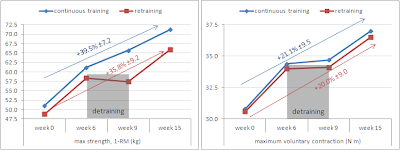6 Weeks on, 3 weeks off, 6 weeks on OR 15 weeks on - what is more "productive"?
Aside from the longer, more in-depth articles here at the SuppVersity, the studies, we are dealing with on a daily basis are usually not older than max. 4 weeks. In view of the fact that even "Prof. Dr.", i.e. me, is only human, it sometimes happens that I a) either miss the publication of an interesting paper or b) file it under "candidates" and then forget about it... the latter happened with a study, Steven referenced in a brief discussion we had on facebook about "priming muscles for new growth". Since the results do however fit in pretty nicely with the concept of "skeletal muscle hypertrophy" I have been trying to establish in the course of the latest installments of the Intermittent Thoughts (yes, there will be a follow up on testosterone tomorrow ;-), I decided that it was about time to finally acknowledge the results of a May 2011 paper by Riki Ogasawara et al. (Ogasawara. 2011).
In their 15-week randomized trial, Ogasawara and his colleagues put 15 young (24.7y), previously untrained male subjects onto identical training regimen. In three supervised training sessions per week the subjects performed 3 sets of 10 reps at 70% of their predetermined 1-RM max. The latter was re-assessed every three weeks and the weight was adjusted appropriately. After 6 weeks of training 8 randomly selected subjects "had" to take 3 weeks off (retraining group), while the rest of the subjects kept their regular 3x per week training schedule (continuous group). At the beginning of week 9, the now "detrained" subjects resumed their training regimen, until after week 15, a final testing session was scheduled to provide the data we need to answer a question, of which I know that it already preys on your minds: "Did the three weeks away from the gym compromise the progress in the retraining group?"
 |
| Figure 1: Development of triceps brachii and pectoralis major CSA of the continuously training and the detraining/retraining group in the course of the 15-week study period (data adapted from Ogasawara. 2011) |
If we now assume that with my reluctance to take even a complete week off, my size gains would already have reached the "quasi-plateau" that is situated to the right of the logarithmic graph which describes the CSA development of the continuous training group, one could even make an argument that I and any other advanced trainee, whose gains have been slowing down over the last couple of weeks, would see an even more profound "growth boost" after 3 weeks of detraining, than the previously untrained subjects in the Ogasawara study. In fact, the increase in the amount of muscle mass I would be able to accrue per week, might not only compensate (within the statistical margin ;-), but rather surpass the gains I thought I constantly fear I could "miss" during my off time.
 |
| Figure 2: Development of bench press 1RM strength and triceps brachii maximum voluntary contractive force of the continuously training and the detraining/retraining group in the course of the 15-week study period (data adapted from Ogasawara. 2011) |
 |
| Figure 3: Development of bench press 1RM strength (left) and triceps brachii maximum voluntary contractive force to triceps brachii CSA ratio (data adapted from Ogasawara. 2011) |
Detraining is neither for pussies nor for retiring athletes, only
I guess, the foregoing subheading, summarizes the main take-away message of the study quite nicely. In view of the non-existent loss in muscle mass and strength in the course of the detraining period and the subsequent "growth spurt" (relative steep linear vs. leveled logarithmic increases in weeks 9-15), it should be obvious that the incorporation of strategic detraining periods into your training schedule is more than a welcome opportunity for laziness (something that totally turns me off, btw.). It is rather a phase where the reconstruction processes you have learned about in the Hypertrophy 101 and the subsequent installments of the Intermittent Thoughts will carve the way for future gains. Whether this will suffice to soothe the little man in your ear, I don't know... maybe you can negotiate a 2-weeks detraining period for the start ;-)
